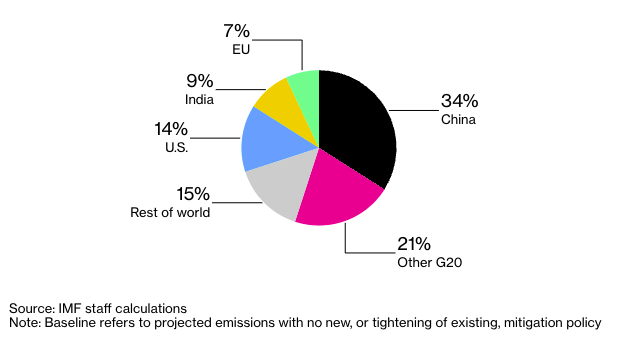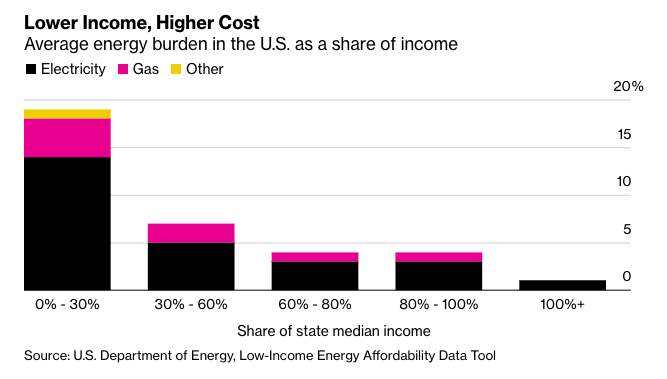Carbon Pricing May Boost Global Inequality
from Bloomberg
By Jana Randow and Reade Pickert | November 10, 2021
One of the most popular strategies for fighting climate change could come at the cost of even greater inequality in the world economy.
The policy, known as carbon pricing, would impose a charge on businesses and consumers with the hope of curbing greenhouse gas emissions. Whether and how to adopt such a levy is a topic of keen debate at the COP26 summit in Glasgow.
A concern is that such an approach would risk disproportionately hurting the world’s poorest households that are already suffering the most from global warming. That’s because they tend to spend a larger share of their income on gas, heat and other emissions-generating activities.
“They will be harder hit by carbon pricing,” said Baoping Shang, a senior economist at the International Monetary Fund and author of a recent paper on the distributional impacts of carbon pricing. “First, in many countries, it’s going to worsen inequality and that’s when government support is most important.”
Ecuador, Nigeria and Iran have already seen violent protests over the years against higher prices at the pump — even without such a levy — offering a foretaste of the kind of uproar that could be in store should politicians choose to introduce one.
In France, the world’s largest collector of carbon-tax revenue, the government was forced to scrap plans in 2018 to boost a surcharge on fuel following a months-long revolt.
Worst Offenders
China and U.S. are forecast to drive baseline carbon emissions in 2030
 Note: Baseline refers to projected emissions with no new, or tightening of existing, mitigation policy.
Note: Baseline refers to projected emissions with no new, or tightening of existing, mitigation policy.
Such public outbursts highlight the need to better understand distributional consequences of carbon pricing, and find strategies to ensure rising inequality won’t be the price for protecting the planet.
Letting climate change run its course would have dire consequences. The world is on track to warm by 2.7 degrees Celsius (4.9 degrees Fahrenheit) by the end of the century, according to the latest United Nations estimates, far above the preferred 1.5 degree limit set by the Paris Agreement.
The levies alone aren’t seen as sufficient to achieve climate goals. Only 10 of the 60 active carbon markets and taxes have high enough prices to achieve the goals of the Paris Agreement, according to BloombergNEF analysis.
Pushing Into Poverty
Climate change in and of itself exacerbates inequality and could push an additional 68 to 135 million people into poverty by 2030, according to the World Bank. And if the most dire projections on future economic damage prove true, other research has shown climate change would cause inequality to rise between countries, reversing decades of progress.
Without support, carbon pricing could burden the poor even more since they often can’t afford energy-efficient housing, exposing them to greater heating costs. In the U.S., energy prices are already up 30% from a year ago, the most since 2005. Lower-income families also tend to live in areas with insufficient public transportation, making them more reliant on their own cars.
That was the case in Sweden, one of the first countries to introduce a carbon price in 1991 and now has the world’s highest. A study into the impact on different income groups between 1999 and 2012 showed an increasing burden on lower-income people that highly correlated with the country’s recent rise in income inequality.
It’s these kind of concerns that fueled France’s yellow-vest protests that started in 2018, according to a paper published in August. Activists were deeply concerned about climate change and supported curbing it, they just considered the government’s choice of policy unjust.
Lower Income, Higher Cost
Average energy burden in the U.S. as a share of income
 Many countries are attempting to offset some of the impact of climate policies on people’s wallets and firms’ balance sheets through tax cuts or credits, refunds or support for green investments. Canada and Switzerland are among countries already returning part of the money raised on behalf of the environment to their citizens, and others like Germany and Austria are considering similar initiatives.
Many countries are attempting to offset some of the impact of climate policies on people’s wallets and firms’ balance sheets through tax cuts or credits, refunds or support for green investments. Canada and Switzerland are among countries already returning part of the money raised on behalf of the environment to their citizens, and others like Germany and Austria are considering similar initiatives.
Some U.S. states are using the funds for improving homes’ energy efficiency, while others provide direct support to low-income customers to help them pay their electricity bills.
“What we need to talk about is a policy bundle,” said Gokce Akin-Olcum, a senior economist at the Environmental Defense Fund in Boston. “There is no single policy that we should expect to carry the full weight.”

